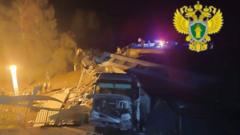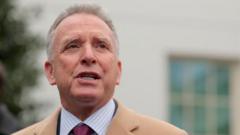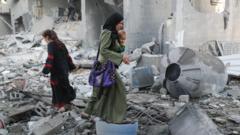Ukrainian President Volodymyr Zelensky has accused Russia of undermining the credibility and preparation of upcoming peace talks as they await negotiating proposals ahead of discussions scheduled in Istanbul. Kyiv emphasizes the necessity of a clear agenda and an unconditional ceasefire for meaningful dialogue to occur.
Ukraine Accuses Russia of Sabotaging Peace Negotiations Ahead of Istanbul Meeting

Ukraine Accuses Russia of Sabotaging Peace Negotiations Ahead of Istanbul Meeting
Tensions rise as Ukraine challenges Russia's commitment to peace discussions before upcoming talks in Istanbul.
In a move that has raised eyebrows in Ukraine, Russian officials have confirmed their attendance at peace negotiations set for Monday in Istanbul. However, Ukraine’s President Volodymyr Zelensky has cast doubt on Russia's genuine desire to make progress, highlighting the absence of Moscow’s negotiating proposals—a critical component for Kyiv. Kremlin spokesperson Dmitry Peskov mentioned that Russia's conditions for a ceasefire would be a topic of discussion in the upcoming meeting. Yet, Zelensky insists that Russia aims to ensure that the meeting yields no substantial outcomes.
"For a meeting to be meaningful, its agenda must be clear, and the negotiations must be properly prepared," stated Zelensky, underscoring Ukraine's commitment to achieving an "unconditional ceasefire." Recent discussions in Istanbul had previously led to a prisoner exchange but no substantial resolutions to the conflict, which has seen Russia occupying approximately 20% of Ukrainian territory since its aggressive invasion in February 2022.
Ukrainian Foreign Minister Andrii Sybiha affirmed that Kyiv had already put forth its proposals to Russia, urging that a ceasefire is essential for promoting further negotiations. He expressed optimism about continuing talks, asserting that it is imperative to work toward ending the war within the current year. During a recent joint press conference with Turkish Foreign Minister Hakan Fidan, Sybiha reiterated these points.
While neither President Putin nor Zelensky is expected to participate directly in Monday's discussions, Turkey is aspiring to eventually convene a high-level summit that could include key leaders like former President Trump. Peskov noted that Russia's ceasefire conditions would remain undisclosed, stating that a summit could only occur if preliminary negotiations yield substantial advancements.
Adding complexity to the diplomatic landscape, General Keith Kellogg, a former envoy to Ukraine under Trump, recently stated that Russian concerns regarding NATO enlargement should be taken seriously. He remarked on Trump's frustrations with Russia's perceived stubbornness but reinforced the importance of continuing dialogue.
Additionally, Trump's earlier communications with Putin, in which they discussed a US-proposed ceasefire agreement and a commitment to negotiations, showcase the ongoing involvement of external powers. Recent promises from Germany to assist Ukraine in developing long-range missiles further complicate the dynamic, with the Kremlin warning that such actions could jeopardize peace efforts.
As the conflict escalates, numerous international actors are actively monitoring the interactions in Istanbul, hoping for a resolution that could facilitate an end to hostilities and restore peace in the region.
"For a meeting to be meaningful, its agenda must be clear, and the negotiations must be properly prepared," stated Zelensky, underscoring Ukraine's commitment to achieving an "unconditional ceasefire." Recent discussions in Istanbul had previously led to a prisoner exchange but no substantial resolutions to the conflict, which has seen Russia occupying approximately 20% of Ukrainian territory since its aggressive invasion in February 2022.
Ukrainian Foreign Minister Andrii Sybiha affirmed that Kyiv had already put forth its proposals to Russia, urging that a ceasefire is essential for promoting further negotiations. He expressed optimism about continuing talks, asserting that it is imperative to work toward ending the war within the current year. During a recent joint press conference with Turkish Foreign Minister Hakan Fidan, Sybiha reiterated these points.
While neither President Putin nor Zelensky is expected to participate directly in Monday's discussions, Turkey is aspiring to eventually convene a high-level summit that could include key leaders like former President Trump. Peskov noted that Russia's ceasefire conditions would remain undisclosed, stating that a summit could only occur if preliminary negotiations yield substantial advancements.
Adding complexity to the diplomatic landscape, General Keith Kellogg, a former envoy to Ukraine under Trump, recently stated that Russian concerns regarding NATO enlargement should be taken seriously. He remarked on Trump's frustrations with Russia's perceived stubbornness but reinforced the importance of continuing dialogue.
Additionally, Trump's earlier communications with Putin, in which they discussed a US-proposed ceasefire agreement and a commitment to negotiations, showcase the ongoing involvement of external powers. Recent promises from Germany to assist Ukraine in developing long-range missiles further complicate the dynamic, with the Kremlin warning that such actions could jeopardize peace efforts.
As the conflict escalates, numerous international actors are actively monitoring the interactions in Istanbul, hoping for a resolution that could facilitate an end to hostilities and restore peace in the region.




















